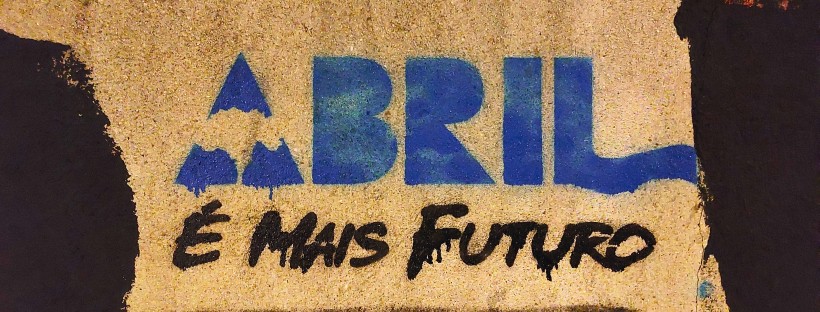A year ago, in March 2023, I published the first half of this experiment. I took pictures of political billboards in Lisbon, Portugal, and analyzed them. That first part, which you can read here, was about the billboards of all major (and some minor) Portuguese right-wing parties. Since then, I continued my strolls and even intensified my flâneur activities, taking pictures of left-wing parties’ political advertisements across the city. Like last year, most pictures are taken while I bike to my office, crossing some of the most traffic-intense avenues of Portugal’s capital.
The national elections are already here, and soon afterward it will be time for the elections of the European Parliament, with the celebrations for the 50th anniversary of the Carnation Revolution in between. The Portuguese Left is in the middle of an internal reconfiguration, with the incumbent Socialist Party affected by a huge corruption scandal that caused Prime Minister António Costa to resign. What will happen to the Portuguese Left? Is the last orthodox Communist party in Western Europe going to survive? Will the socialists be able to surprise their detractors, rising once again from their ashes?
To stay updated about the day-by-day semiotic analysis of political billboards, follow the Telegram channel of POP (here) and the BlueSky account (here).
Meanwhile, enjoy the read.
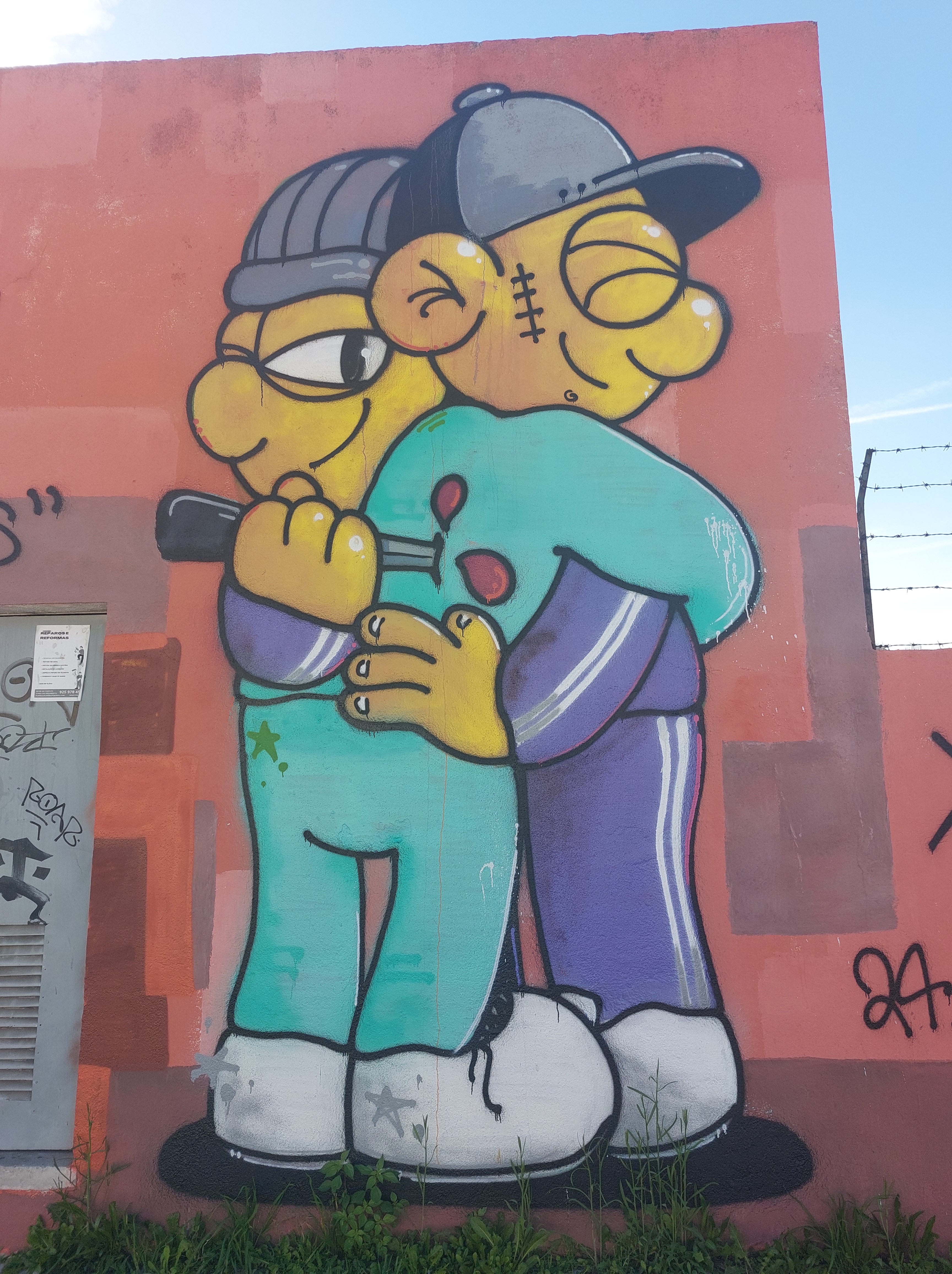
The Portuguese Left has been in power since 2015. Most of the time, the Socialist Party has been in power alone by forming minority governments, rather common in Portugal. The exception was the 2015-2019 period, when the socialists reached an agreement of confidence and supply with the radical Left (Left Bloc and Communist Party). Once this left-wing government, called in Portuguese ‘geringonça’ (contraption) ended because the budget law proposed by the socialists did not pass, Portugal had snap elections in 2022. The Socialist Party, against all odds, managed to win by a large margin, with 41.4% of the votes, and form a minority government. In November 2023, however, Prime Minister António Costa resigned amid corruption investigations.
Who will be able to take advantage of this situation? Will the Right build its success on the socialists’ corruption scandal, or will other leftist parties succeed in mobilizing the disappointed electorate? This is a very important question because the next government may depend on its answer. In the meantime, let’s look at the Portuguese Left’s election campaign through its billboards.
Let’s start from the Left Bloc (Bloco de Esquerda – BE). Left Bloc was part of the geringonça that ruled Portugal between 2015 and 2019. Together with the communists, they gave their supply and confidence to the socialist government. This arrangement seemed to work pretty well for BE, which in the 2019 elections obtained 9.5% of the votes and 19 seats. In 2022, however, the party lost 14 seats, in their worst electoral performance since 2002.
To get back on track they are insisting (as it is possible to see from their billboards) on two interconnected issues: housing crisis and financial speculation. In this billboard, the Left Bloc tackles housing, one of the biggest problems in Lisbon, saying: “Banning the sale of houses to non-residents is radical? No, it’s radical when the salary does not get to the house.”

Another example is the billboard below, where the party’s leader is next to the following message: “For housing, don’t give them a break”. It would be interesting to know who do they by “them”, and the next billboards will shed light. In another billboard, the Left Bloc asks: “Their profit or our lives?”. In it, they accuse big corporations such as Galp (gas), Santander (banking), Pingo Doce and Continente (supermarkets) of making profits that harm ordinary people in times of inflation. This is both left-wing and populist because it proposes a worldview that morally opposes the common people to the (greedy) elites.
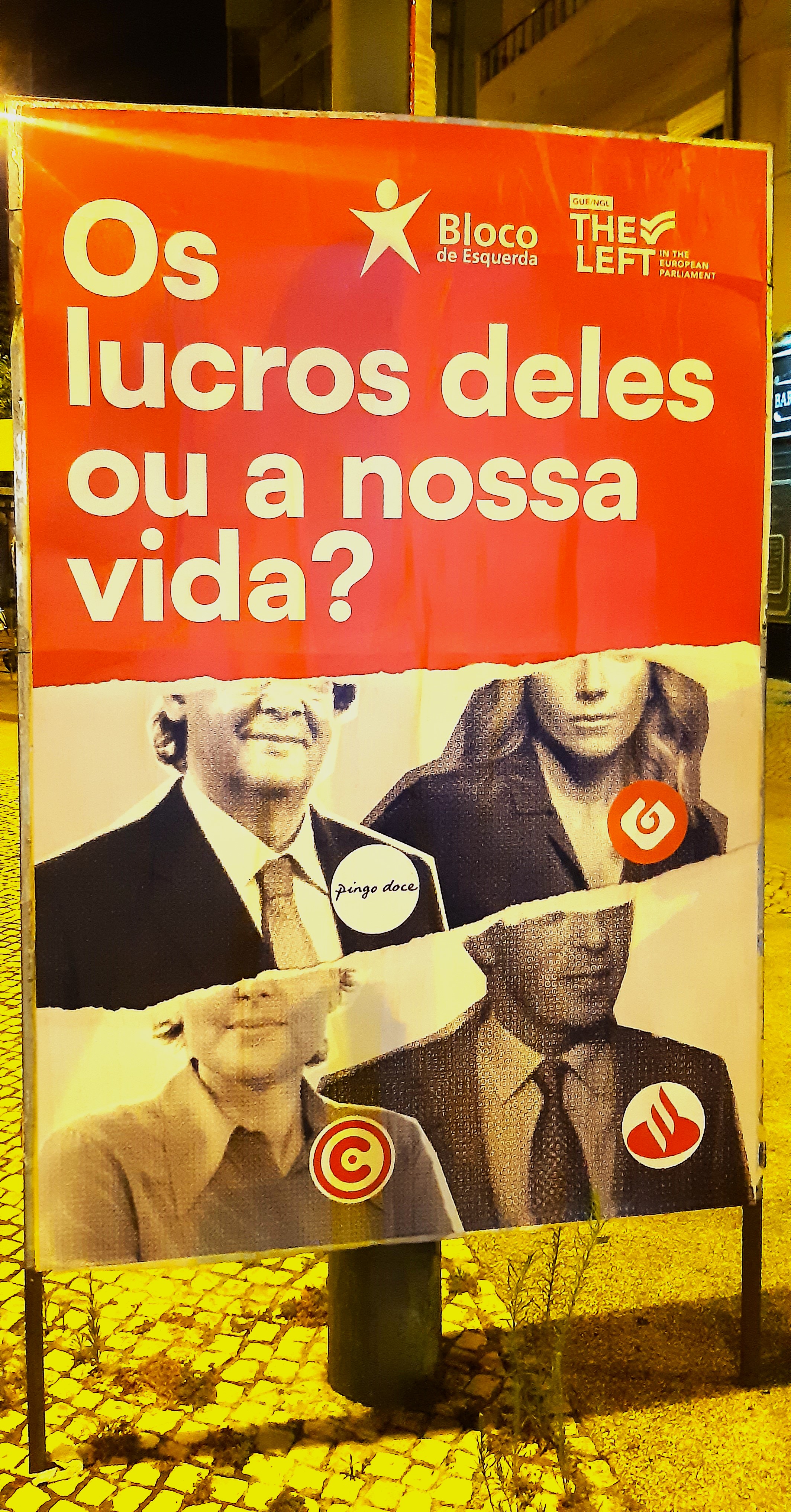

In a more recent billboard, the Left Bloc says “taking the country seriously”. The image represents the party’s coordinator Mariana Mortágua smiling and almost hugging a man, in a people-centric message that together with the many anti-elitist messages we saw before constitutes a quite populist message overall. Their last billboard says “doing what has never been done before. Housing, salaries, health”, remarking the radical nature of the party’s message.


Another radical left party is the Portuguese Communist Party (Partido Comunista Português – PCP). Together with the Left Bloc, the PCP was part of the geringonça that ruled Portugal between 2015 and 2019, giving their supply and confidence to the socialist government. At the 2019 elections, they got 6.3% of the votes and 10 seats. However, in 2022, the party only got 4.4% of the votes going from 12 to 6 seats. This was the worst performance ever for the PCP, the oldest party in the Portuguese political system and a key actor before and during the Revolution of 1974.
The party is both immutable, in its orthodox Marxist–Leninist political line that brought them to *not* condemn the Russian invasion of Ukraine in 2022. At the same time, PCP is changing rapidly because the leaders are increasingly born-and-raised intellectuals rather than working-class people with manual labour experience. The party’s focus, though, remains on workers. Their billboards across Lisbon cover topics similar to those covered by the Left Bloc: the profit of banks and big corporations against the interests of the common people (workers), the housing crisis, the necessity to raise salaries and pensions, and the fight against precariousness.
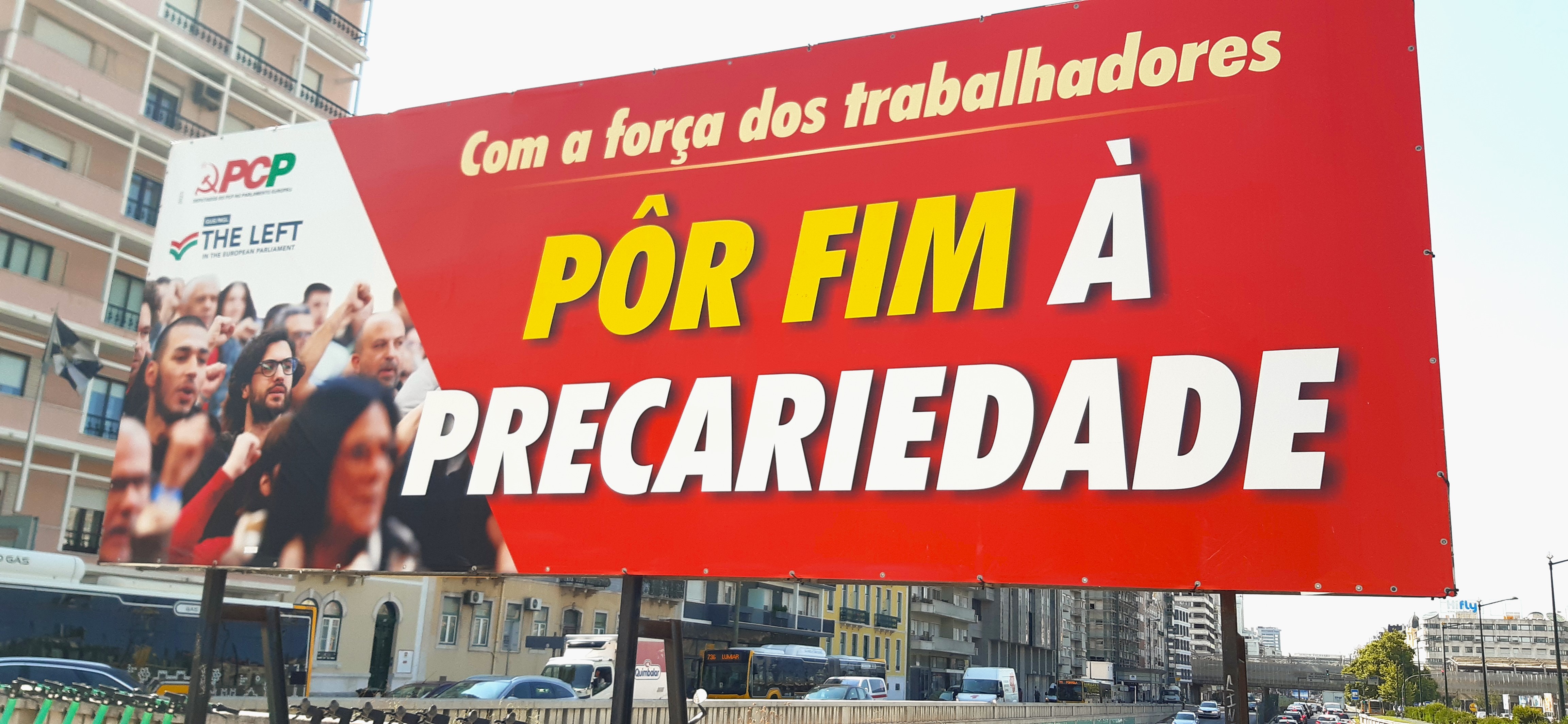
The populist construction of society in the PCP rhetoric is based on two intertwined concepts: “o povo” (the people) and “os trabalhadores” (the workers) in opposition to the profits of big corporations. The party also follows an illiberal vein (‘enough talking’, they say on one of the billboards).

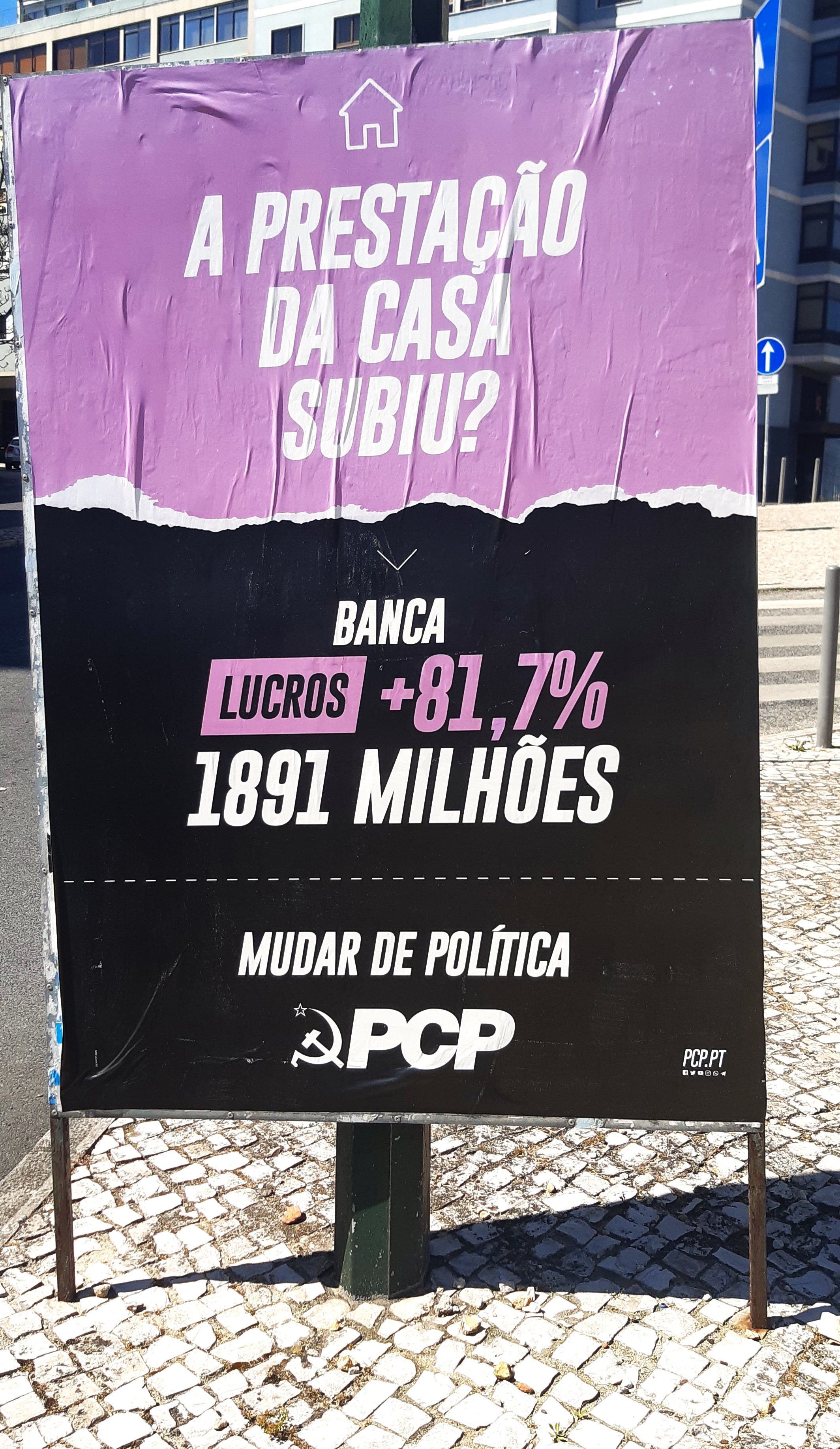
Overall, considering the most recent billboards, PCP does not seem to have anything to offer to the Portuguese population at large: not a charismatic leader, not a discourse that goes beyond the workers, not an image that can attract younger generations, no focus on post-materialistic issues such as racism, the environment, LGBT+ rights. The 2024 elections will very likely be the worst in the party’s history. What remains to be seen, is how PCP will look like afterwards and if it will recover.
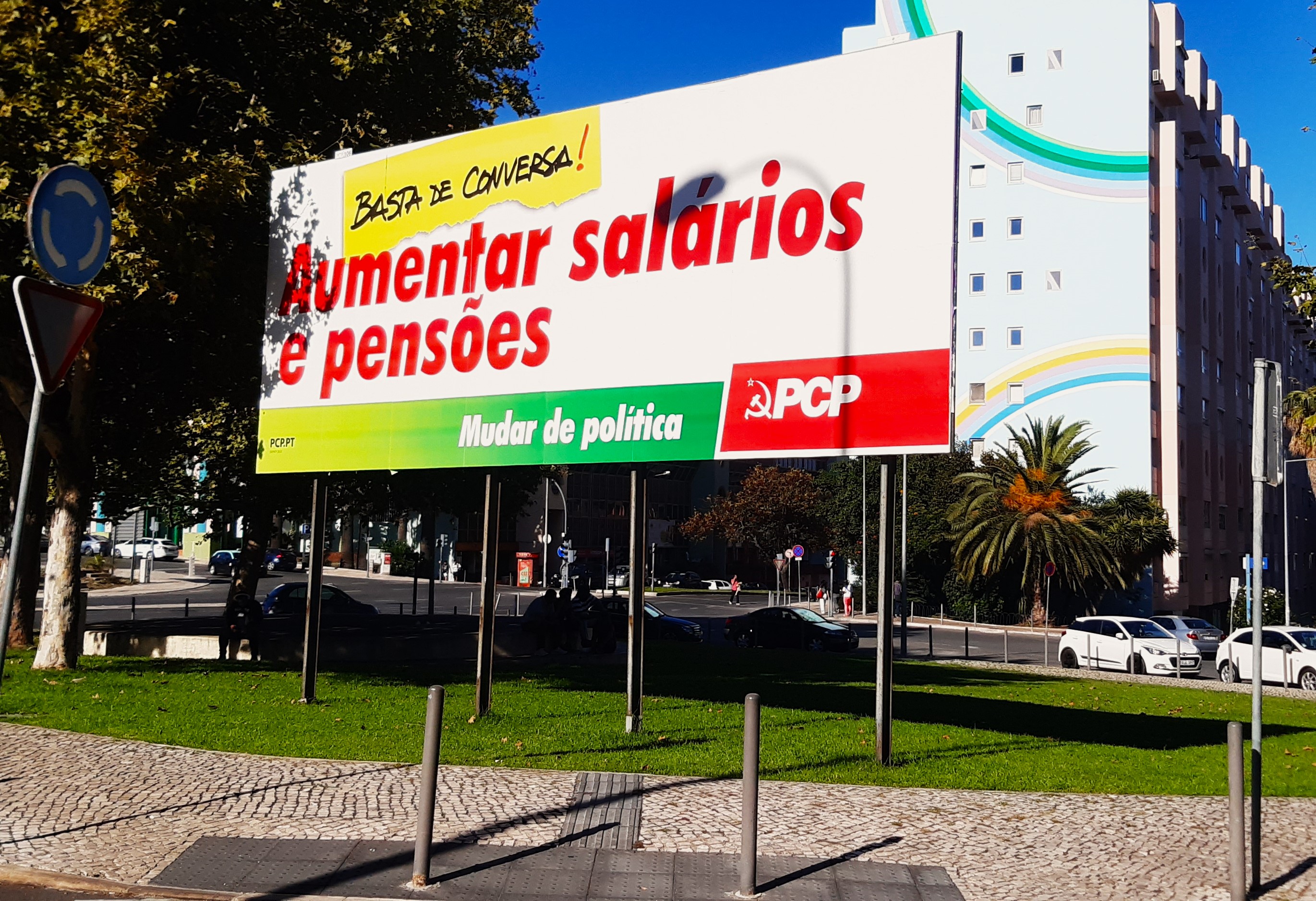
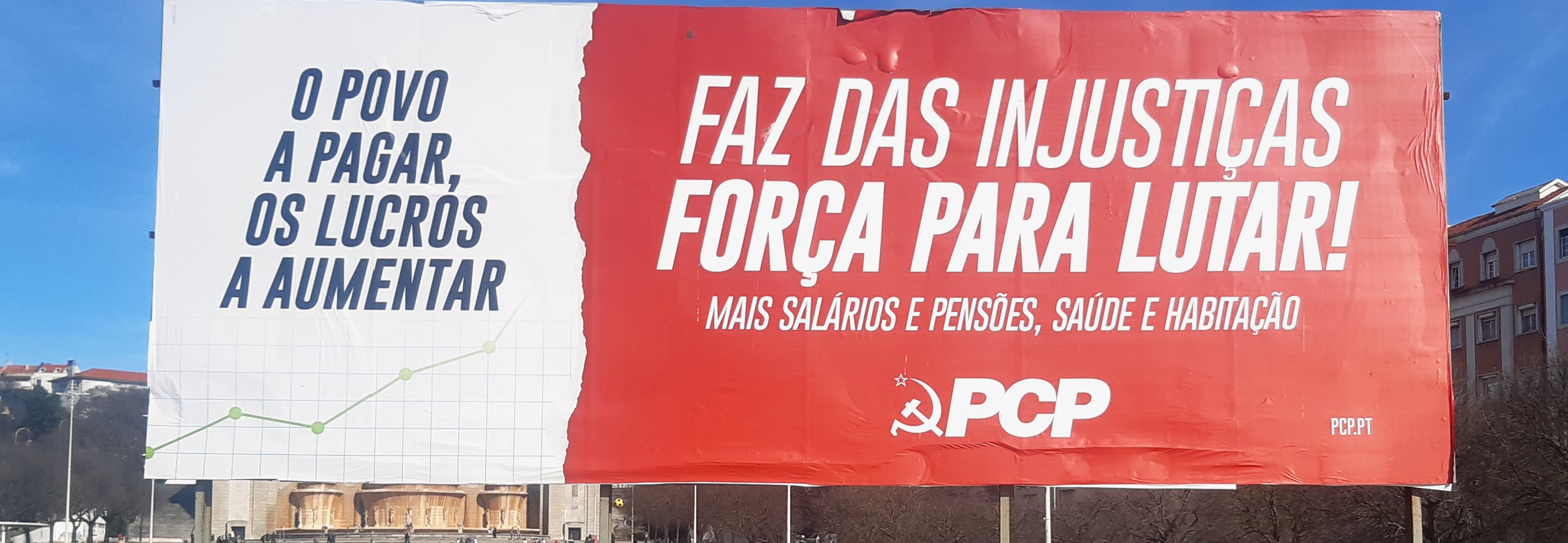
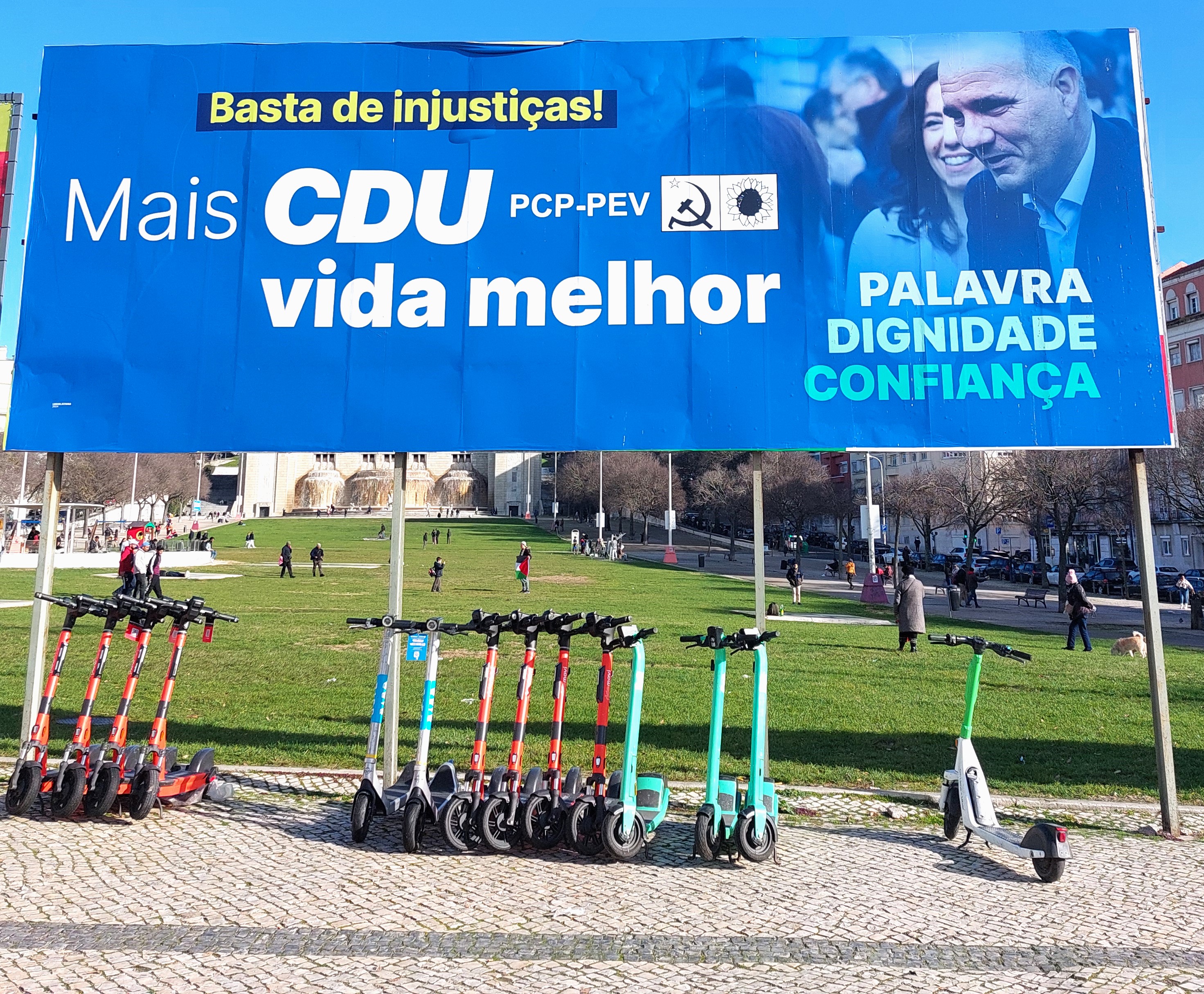

Let’s now move to a less classic party: People Animals Nature (Pessoas Animais Natureza – PAN). PAN was founded in 2009 and entered the parliament in 2015 for the first time. So far, PAN had its greatest success in the 2019 elections, managing to elect four MPs in the national parliament, but they went back to only one MP in 2022. Like VOLT in the series about right-wing parties, also PAN declares to be neither left nor right, but its political message is more to the left than VOLT’s. On several occasions, the party leader, and currently only MP, Inês Sousa Real made a point that PAN “doesn’t align itself with the traditional left-right dichotomy”; rather, it looks on both sides of the political barricade to advance the values and causes PAN cares about. These values, despite the party’s name, seem to have a focus just on animals, forgetting nature and people.
As one can see from the party’s billboards, PAN is strongly against bullfights, which on the other hand are strongly supported by Chega and more generally by the conservative side of Portuguese society. This billboard was affixed near Campo Pequeno, a historic venue for bullfights in Lisbon. The billboard reads: “Traditions change. It’s called evolution! Abolish bullfights now!”.

In the same location, PAN also put another billboard on the topic. Citing the words of Pope Francis when he came to Lisbon for the World Youth Day in 2023, the billboard says: “It is against human dignity to let animals suffer needlessly and to dispose indiscriminately of their lives”.
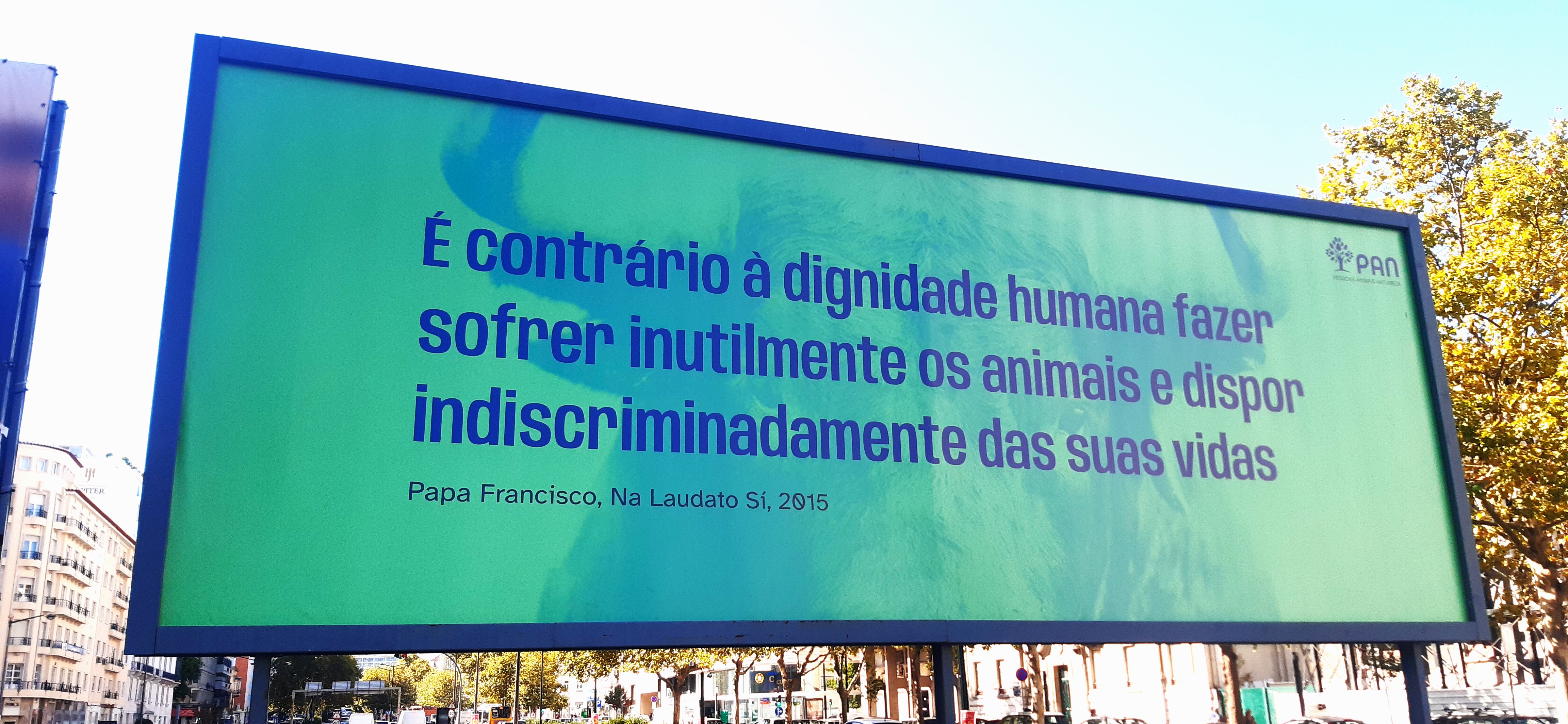
Finally, a much cooler billboard about the same topic appeared a few days before the 2024 national elections. First, IKEA started a sort of genius advertisement campaign by blasting Costa and implying that IKEA’s bookcases are perfect for hiding bribes. Then, PAN imitated the style of IKEA and came out with the following billboard, once again against bullfighting. Their new billboard seems, at first sight, an IKEA advertisement for a bed. However, in line with PAN’s anti-bullfight stance, the billboard says: “Bullfights only in bed. And with consent.” This was very likely the best billboard in Lisbon before the 2024 national elections. However, PAN’s situation does not look too bright.

The main problem is the lack of a clear program and of an identifiable ideology, which might be reflected in the colour palette chosen for the billboards (white, green, blue contrary to the red and purple of most other left-wing billboards). It is interesting to note that PAN’s former MP, Cristina Rodrigues, became Chega’s parliamentary advisor in 2022. Rodrigues left PAN in June 2020 and is now a Chega militant. Alas, this is a common fate for parties that are “neither left nor right”. Moreover, beyond bullfights, I could not see any PAN billboard with a political message, which might reflect the party’s ideological flexibility (reminding me of the Italian 5 Star Movement). The only exceptions were these two billboards. One generically says: “For people, for animals, for nature. Act now!”. The other says: “If nature is your cause, PAN is your party”.
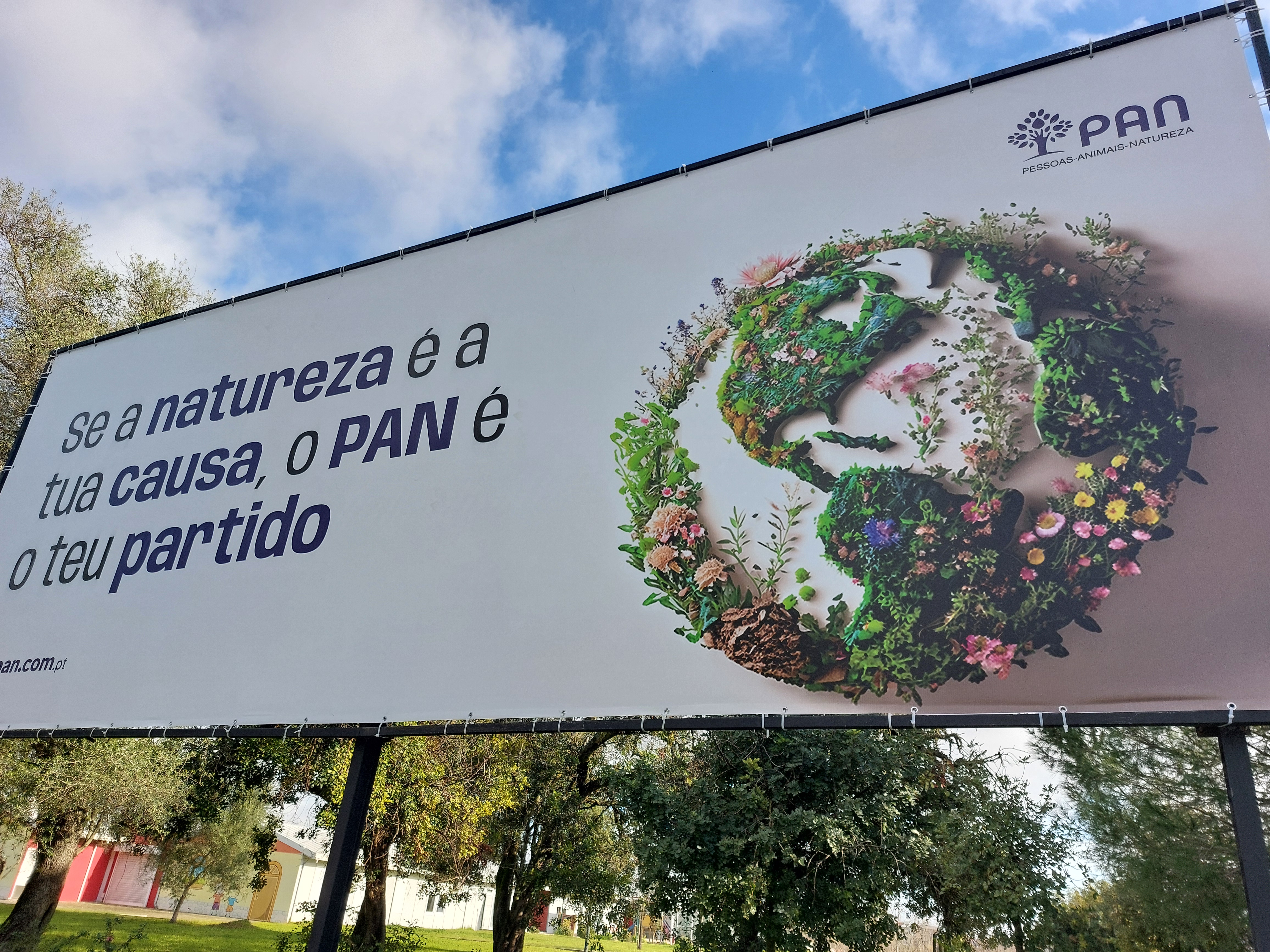

To be able to participate in any future government, PAN tries to remain equidistant from Left and Right. This strategy, however, is not paying off because PAN has been at the opposition for nine years and now is struggling in the polls, at just 1%. At the moment it is unclear whether they will elect any PM.
The next party is ideologically firmly grounded in the Left, and its name is Livre. It was founded relatively recently (in 2014) by Rui Tavares. Tavares is a politician and historian who in 2009 was elected to the European Parliament in the ranks of the Left Bloc. The party’s symbol is a poppy, and it shows that, compared to the rest of the Portuguese Left, Livre wants to be perceived as more engaged with green politics and ecology. Interestingly, Livre is also in favor of Universal Basic Income (UBI).
Livre elected its first representative in the national parliament, Joacine Katar Moreira, in the 2019 elections. However, almost immediately, Livre removed its political confidence from Katar Moreira, who remained non-affiliated for the remainder of the legislation. In 2020 André Ventura, the leader of the far-right party Chega, ended in the Wikipedia article about the racist epithet “Go back to where you came from” for saying it to Katar Moreira.

In 2022, the only MP for Livre elected in the national parliament was Rui Tavares himself. It looks like the party will definitely remain in parliament after the 2024 elections, although its billboard campaign across Lisbon has been quite lame.
First, for the past two years, I could not see any Livre’s billboard in the streets. Then, a few months back, right before the 2024 national elections, Livre probably decided it was time to get some visibility and put out a couple of billboards. In one of them, the party just wrote “LIVRE. The country we want”. Another billboard says “LIVRE. Green. Just. Together.” The messages in the billboards are very generic, abstract, and they seem to preach to the choir. Unless you already know the party’s message, and you agree with it, it seems unlikely that these billboards will move any vote in Livre’s direction. The colors are green and red, in line with the party’s ideology.
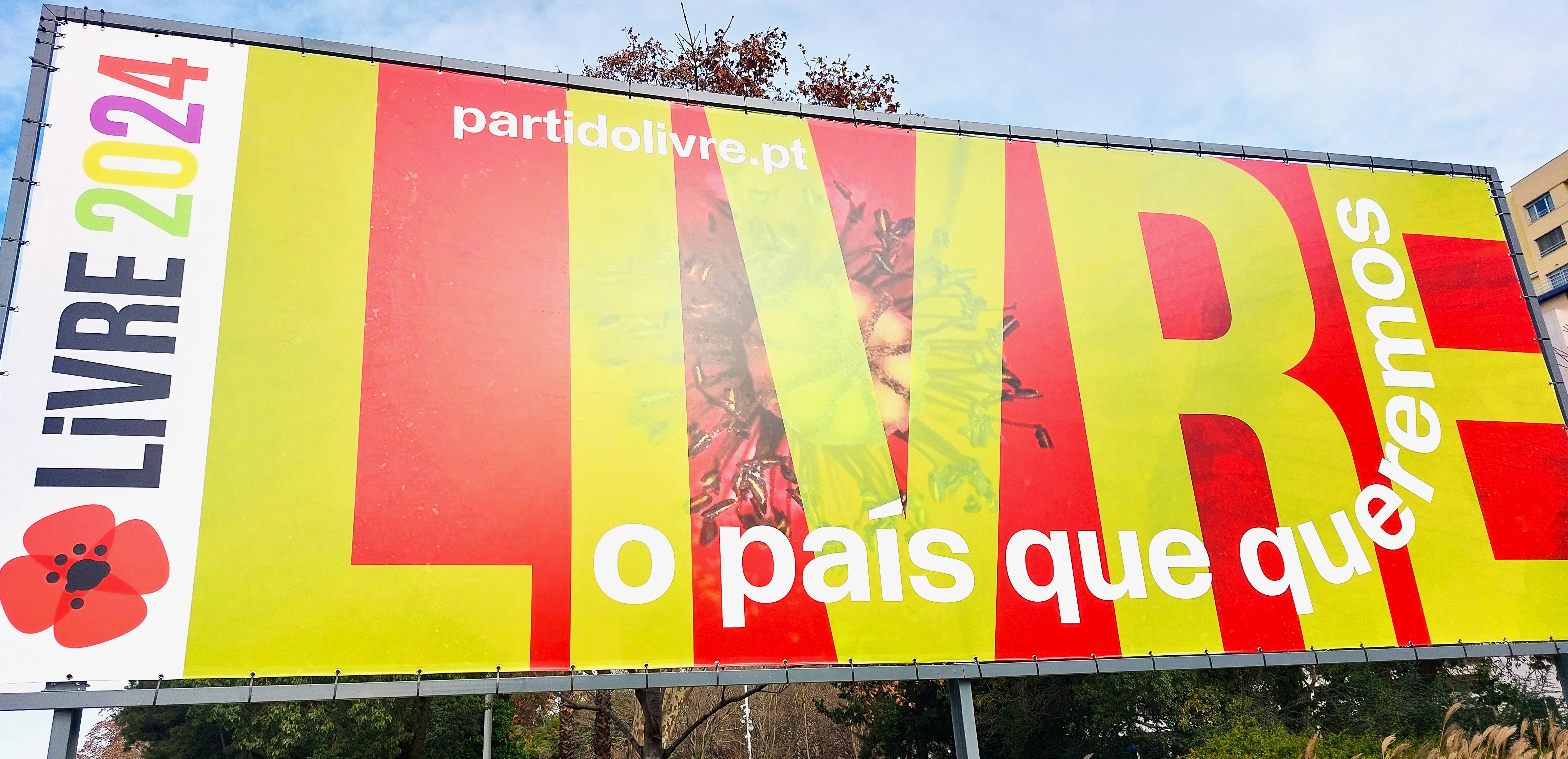

Last, but not least, we must talk about the Socialist Party (Partido Socialista – PS). Since the 1976 elections, the first free legislative elections after almost half a century of dictatorship, PS has been the most-voted party 8 times out of 16. In this historical moment, PS is living between its past glory and an uncertain future. Currently, PS is the (super-)incumbent, as the party has been in power since 2015 with no interruptions. PS has been the power in Portugal for almost a decade, therefore it *is* the system. Moreover, being in the middle of a corruption scandal, accusing the ‘corrupt’ elites in a populist fashion would be even less credible. Accordingly, since it cannot be anti-elitist or anti-establishment, most of its communication revolves around people-centric messages.
One of the party’s billboards, form before the November corruption scandal, portrays the former leader António Costa hugging someone, presumably a supporter, showing the strict contact between PS and “the people”. The slogan reinforces the message: “Governar a pensar nas pessoas” (Governing with people in mind). In another example of the party’s demoticism (closeness to ordinary people), a poster shows a diverse representation of “the people” (as pessoas). It is balanced in terms of gender, 2 men and 2 women, and it represents mostly young people, the electorate PS desperately needs to stay in power after the 2024 elections.


Another topic that PS wants to stress is the 50th anniversary of the Carnation Revolution (1974-2024), which follows the 50th anniversary of the party itself (PS was officially founded in 1973 in a tiny German city in North Rhine-Westphalia). This year will see a growing politicisation of the commemorations of 25 April and PS has a strong interest in being perceived as the party that embodies the values of democracy and anti-authoritarianism.
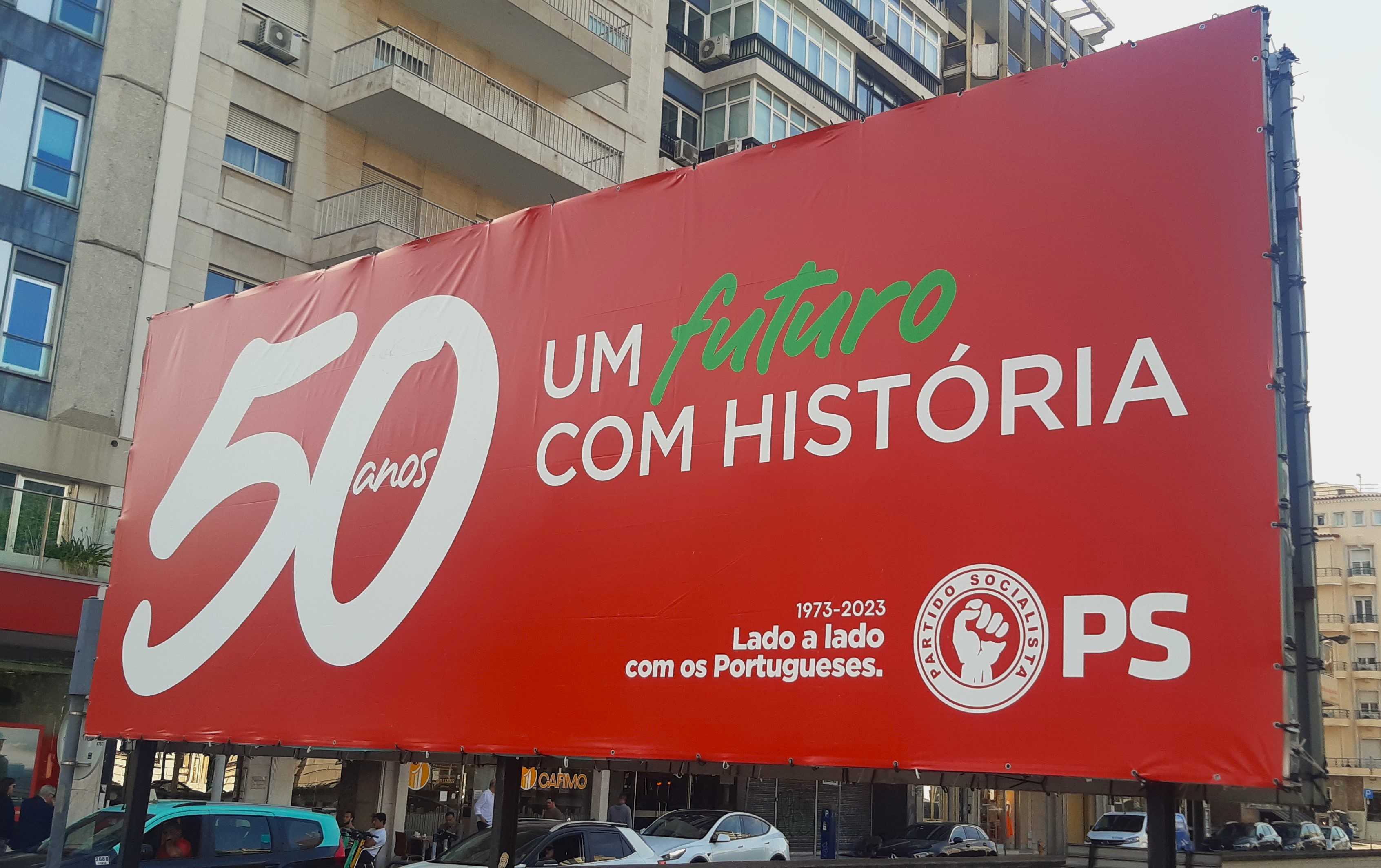
Before the corruption scandal that in November 2023 forced Costa to resign, PS was the party that more than anything else embodied the Portuguese political system, after almost a decade in power and after having won the 2022 elections with a wide (and unexpected) margin. Maybe the investigations will lead to nothing, maybe PS will win the next elections, maybe Costa’s career in the European institutions is not compromised. But, for the moment, the blow is hard, and it will be difficult for the PS to stop the advance of the Right. The newest posters with the new party leader Pedro Nuno Santos, promise more action and to bring Portugal together (as if there was an ongoing civil war in the country). The new billboards, interestingly, gave up the traditional red to propose a combination of white and green that has nothing to do with the party’s identity.
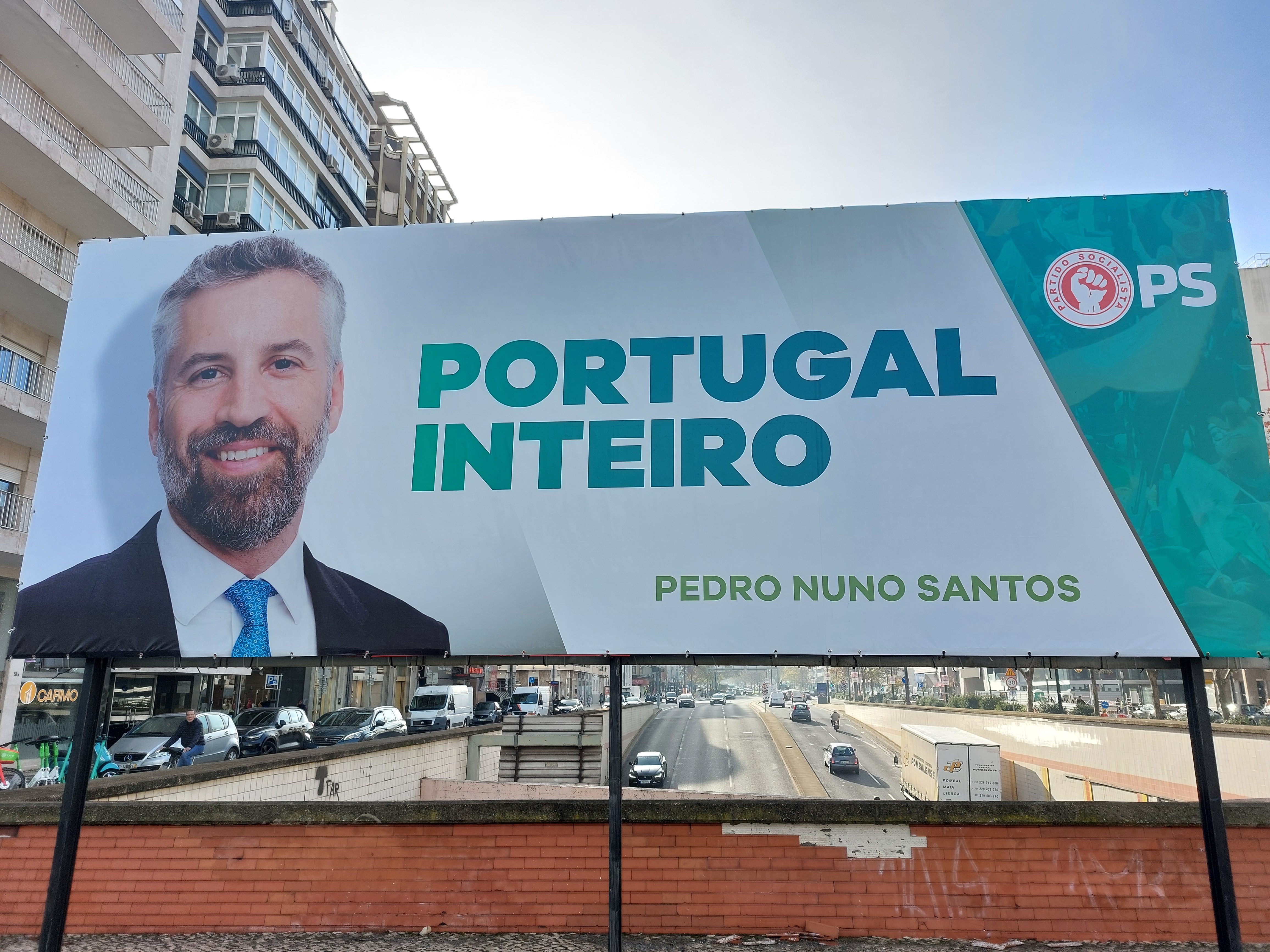

That’s all for this episode. See you on the other side of the 2024 elections and the 50th anniversary of the 25 of April with more content about the political billboards across Lisbon! Till then, here you find a gallery of billboards from the 2024 campaign that I rated according to their political message and aesthetics.
